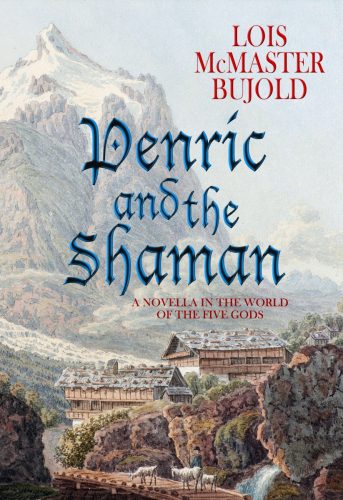Lois McMaster Bujold, who won the 2017 Hugo Award for Best Series (for the Vorkosigan Saga), is a fantastically decorated writer. Among her many accolades are six Hugos, three Nebulas, three Locuses, and as of 2010 (according to wikipedia), has sold over two million books.
And because I’ve been derelict in my studies of speculative fiction, I hadn’t heard of her until I saw Penric and the Shaman on the list of nominated novellas for the 2017 Hugos.
It’s tough to give a fair review to a novella that is set smack-dab in the middle of an established series: the second novella in a series of five that is itself set within a larger series. There’s an established world, pantheon, society, and long-standing relationships between characters, nations, and religious sects that would have been prohibitively difficult (not to mention ill advised) to include in the novella.
As such, there’s a bit of catch-up on the part of a reader hopping in to the Chalion series in its fifth installment. That being said, Bujold did an excellent job of back-filling questions for new readers while making sure that her pacing would keep knowledgable fans interested. Even with her admirable efforts, I found myself occasionally lost while reading Penric and the Shaman. There was just too much information to assimilate. There was plenty of available information between the lines, in character behaviors and dialogue, but keeping track of it is where I became disoriented.
But that’s part-and-parcel of my circumstance as a reader, and not a knock against the book. Bujold’s writing is very good—she imbues a sort of clarity in her writing that makes even the abstract and hallucinatory moments in the novella easy to picture, which helped me a great deal when it came to piecing the story together in larger, implied context.
Penric is a young (too young, according to most of the reactions to him in the story) sorcerer, advisor to a princess, and a divine priest of the “Bastard’s Order”—who represent the Bastard, the unnamed god of the forgotten, abandoned, and etcetera. Penric is also possessed, or perhaps in possession of, a demon, Desmonda, who hangs out in his brain and can occasionally, with Penric’s permission use his body.
Penric is sent off on a mission to capture a runaway shaman, Inglis, who has been charged with murder. When Penric and his cadre of soldiers finally catch up to Inglis in the snowy mountains, they discover that the situation is much more complex than they’d been led to believe, and Penric is tasked with balancing his roles as a clergyman and sorcerer, torn between his desire to help the man he’s chasing and appeasing the hard-nosed military leader who just wants to complete the mission.
Penric and the Shaman is, all-in-all, an excellent story that deals with intriguing themes of belief, death, personal responsibility, and agency within a wonderfully deep framework that I knew almost nothing about. I’m sure I would have loved the story if I was familiar with Bujold’s other work, but as it is, I really enjoyed Penric and the Shaman.


